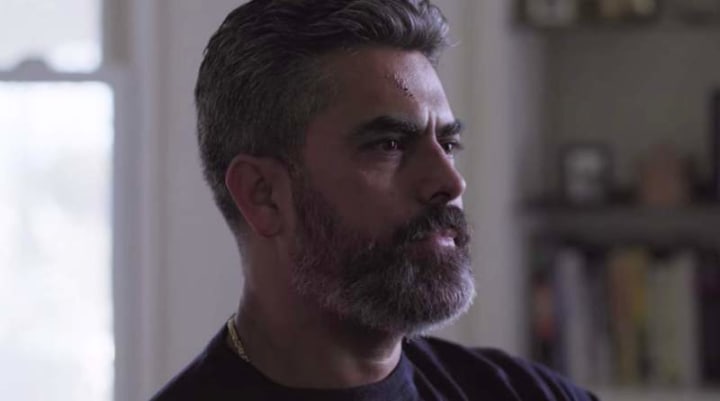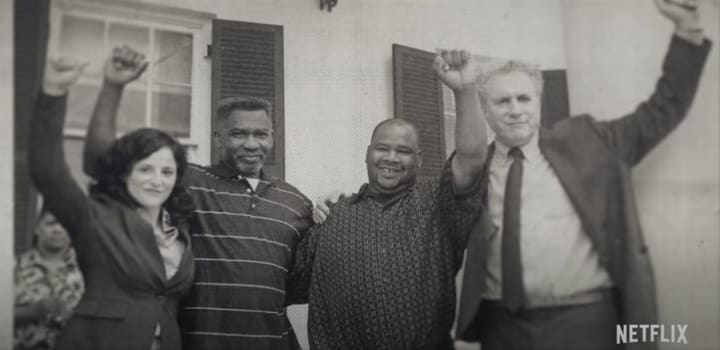Why "The Innocence Files" is the Most Important Thing You Could Be Watching Right Now
Guilty until proven innocent: From faulty forensic science to racial bias and police misconduct - this new Netflix true-crime documentary-series shows the horrific truth about the case of the American criminal justice system and the stories of those who have been wrongfully convicted because of it.

According to the Innocence Project, a nonprofit legal organization that has fought to exonerate innocent men and women incarcerated in the U.S. since 1992, between 2.4% and 5% of all U.S. prisoners are estimated to be innocent. Considering that as of 2019, roughly 2.12 million people in the states are behind bars, this could potentially mean that just over 100.000 people are currently serving time for crimes they did not commit. Additionally, that is 100.000 people guilty of those crimes running free.
The Innocence Files on Netflix follows 8 deeply personal and devastating stories of men whose lives were ripped apart when they were wrongfully convicted and sentenced to prison, and how lawyers of the Innocence Project and within the Innocence Network fought to have them released and case overturned. One of these men is Kennedy Brewer, a man that was sentenced to death in the state of Mississippi on the grounds of suspicious forensic 'science'.

Since the 70s, 1517 people have been executed in the United States, and as of January 1st 2020, 2620 people are currently on death row. 165 individuals have been found innocent and released from death row since 1973, “In other words, for every 10 people who have been executed since the death penalty was reinstated in the U.S., one person has been set free.” And then there is also the case of those who have been found innocent post their execution, which Kennedy Brewer was only inches away of becoming one of.
In 1995, after three years in jail awaiting trial, Brewer was convicted of the rape and murder of his girlfriend’s 3-year-old daughter, Christine Jackson. Brewer was largely convicted on the basis of the testimony from forensic odontologist Dr Michael West who, after examining marks found on the victim’s body, were “indeed and without a doubt” from bites inflicted by Brewer. Not only had West already been suspended from the American Board of Forensic Odontology by the time of the trial, but his testimony was also challenged by Dr Richard Souviron (the odontologist that testified in the Ted Bundy trial) who meant that these bruises weren't even that of human bite marks, but instead from insects found in the environment where the victim was discovered.
Regardless, Kennedy Brewer was sentenced to death and when in 2001 DNA evidence came back proving that he was, indeed and without a doubt, not the perpetrator of the crime, he still remained in jail until 2007 as prosecutors claimed they wanted to retry him. But after an investigation by the Innocence Project in 2008 led to the identification of the actual perp, Brewer was finally successfully exonerated and now a free man after 15 years.
I left the courtroom, went outside, sat down on the bench, got me a cigarette. Well, here comes Peter Neufeld, the founder of the Innocence Project, a man that I despise and have no respect for. [...] he turned around and I said, "Look, don't forget, take some time out this afternoon and go fuck yourself." - Dr Michael West.

The testimony of an eyewitness is the oldest form of evidence there is, and despite the neuroscientific arguments against it, is still considered one of the most convincing types of evidence you could present to a juror and judge. Got a cocktail of circumstantial evidence and a person testifying as they point their finger at the defendant saying "That's him, that's the man that killed my father,"? Well that's just about as powerful as you can get.
Yet the truth is that our memory and sight is highly deceptive and impressionable. In fact, mistaken identification by eyewitnesses is the leading cause of convictions that have later been proven wrong by DNA! As many as 700 people have been exonerated from cases where eyewitness testimony played a part in the trial. Examples of the flaws of our visual memory and the neuroscience behind it is presented in the second part of The Innocence Files: The Witness. Here we go through the incarceration and exoneration of Franky Carrillo (pictured above) who was charged for the murder of Donald Sarpy and served 19 years before he was released, and Thomas Haynesworth who spent 27 years imprisoned in Virginia for the acts of a later convicted serial rapist.
Both of these men were entirely convicted on the grounds of eyewitness testimonies that had been highly influenced by suggestive police procedures that were also fueled by systemic racism. From the case of commonly inaccurate cross-race identification, to vile and ingrained stereotypes of the violent black man, to horrendous crimes and misconduct committed by white supremacist gangs within police forces (such as the Lynwood Vikings which were largely in charge of the investigation and identification of Franky Carrillo)... the odds were set against them the moment that they became a suspect.
“You can see the injustices in those cases in how they [black and latinx people] were initially investigated, how they were held without bail, and in the fact that more cases of wrongful convictions were present in their trials. They get longer sentences and are more difficult to get parole. We even see it in how long it takes us to clear them. On average, it takes us four years longer to clear somebody of color who was actually innocent than it does for us to clear somebody who was white.” - Peter Neufeld for Entertainment Weekly

As the series and acts of the judicial system become uncovered, it is near impossible to not be outraged. It is repulsive to watch as those who have been hit by investigations from the Innocence Project shake their heads in denial and bites their inner cheek with resent and lack of remorse. It makes you wonder what the point of it all is when shallow finality seems so much prioritized to genuine justice.
The behaviour presented is very reminiscent of that shown in the other 2020 Netflix’ true-crime docu-series: Who Killed Malcolm X? in which activist and researcher Abdur-Rahman Muhammad is told countless of times to drop his search of finding who the gunman that killed Malcolm X really was - "somebody is serving jail time, so what more do you want? Leave it alone, move on!" Or the cover-up in How To Fix A Drug Scandal, and procedural misconduct in The Confession Tapes.
It's despicable and awfully depressing. But then you see these men stepping out into the sun, and breathing in the fresh air after years of isolation, and hope and fire is restored. We must continue to talk about these subjects and fight for reform. Accountability and justice will prevail - for the victims, the wrongfully incarcerated, their families, and our society. We cannot, will not, close our eyes.
The Innocence Files is streaming now on Netflix, click here to watch the trailer and here to donate to the cause and learn more about the the Innocence Project.
Read more by Malin Evita: The Power of Silence in Cinema
Deprived from our usual audible stimulation, suddenly what you before would have barely noticed carries the same intensity as that of a Hans Zimmer score. A hand gliding down the handrail of a staircase, a footstep in seeping sand, the flickering sound of leaves in the wind…
About the Creator
malin evita
Creator of Making It: Women in Film






Comments
There are no comments for this story
Be the first to respond and start the conversation.